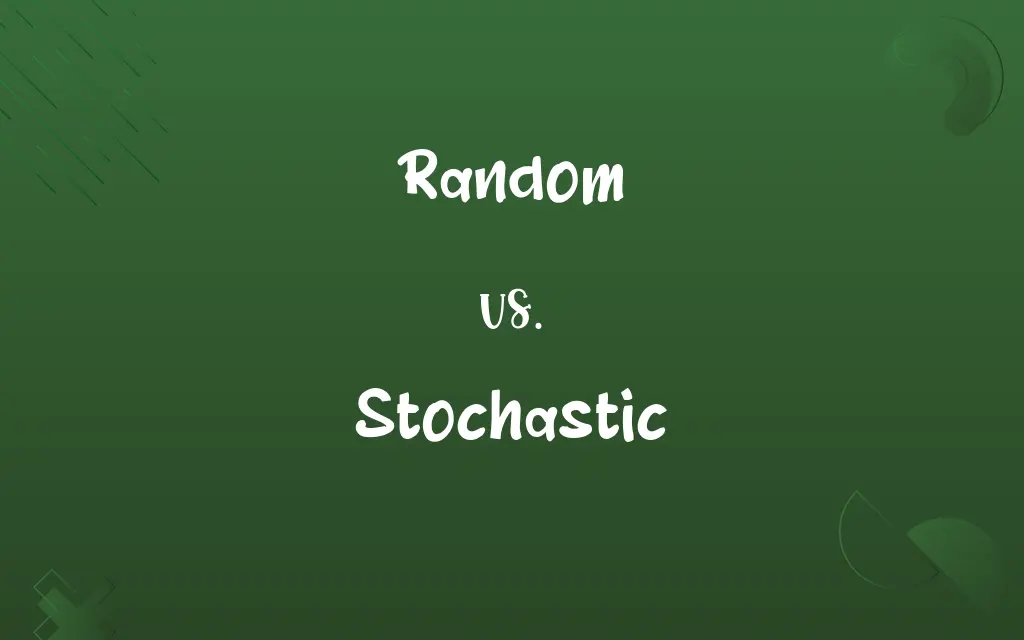Random vs. Stochastic: Know the Difference

By Shumaila Saeed & Hifza Nasir || Updated on March 5, 2024
Random refers to outcomes that occur by chance, without predictability or pattern, while stochastic pertains to processes that are random but can be analyzed statistically over time.

Key Differences
Randomness is a concept that describes outcomes that occur by chance, without any predictable pattern or order.Stochastic, on the other hand, describes processes that incorporate randomness and unpredictability but are subject to statistical analysis and patterns over time.
Shumaila Saeed
Mar 05, 2024
Random events are typically isolated occurrences, where the outcome of one event does not influence another. For example, flipping a coin results in a random outcome of heads or tails, with each flip independent of the last. Stochastic processes involve sequences of random events but allow for dependencies among them.
Shumaila Saeed
Mar 05, 2024
In the context of probability and statistics, randomness is a fundamental concept that underpins the analysis of data and the calculation of chances. Stochastic processes, however, go a step further by modeling the behavior of sequences of random events, providing a framework for predicting future events based on past and present data.
Shumaila Saeed
Mar 05, 2024
Randomness can be observed in simple phenomena like lottery draws or the roll of dice, where each outcome is equally likely and independent of previous outcomes. Stochastic processes, however, encompass more complex systems like weather patterns, financial markets, and population dynamics, where future states depend on both random variables and previous states in a deterministic manner.
Shumaila Saeed
Mar 05, 2024
Despite their differences, both concepts are essential in fields such as mathematics, physics, engineering, and economics. They help in understanding and predicting the behavior of systems under uncertainty.
Shumaila Saeed
Mar 05, 2024
ADVERTISEMENT
Comparison Chart
Definition
Outcomes occur by chance without predictability.
Random processes that can be analyzed statistically.
Shumaila Saeed
Mar 05, 2024
Nature of Events
Isolated and independent.
Sequences of events with dependencies.
Hifza Nasir
Mar 05, 2024
Applications
Simple phenomena like coin tosses.
Complex systems like financial markets.
Hifza Nasir
Mar 05, 2024
Predictability
Outcomes cannot be predicted.
Future trends can be analyzed statistically.
Dua Fatima
Mar 05, 2024
ADVERTISEMENT
Random and Stochastic Definitions
Random
Chance occurrence.
The random selection of lottery numbers can lead to unexpected winners.
Shumaila Saeed
Mar 05, 2024
Stochastic
Probabilistic process.
Stochastic modeling of weather patterns can help forecast future conditions.
Hifza Nasir
Mar 05, 2024
Stochastic
Incorporates randomness.
Stochastic algorithms in computing can optimize search results by introducing randomness.
Shumaila Saeed
Mar 05, 2024
Random
Unpredictability.
Random mutations in DNA contribute to genetic diversity.
Shumaila Saeed
Mar 05, 2024
ADVERTISEMENT
Stochastic
Dependent sequences.
Stochastic processes in genetics study the inheritance patterns over generations.
Hifza Nasir
Mar 05, 2024
Random
Equally likely outcomes.
In a fair coin toss, heads and tails are random and equally likely outcomes.
Shumaila Saeed
Mar 05, 2024
Stochastic
Predictability over time.
Stochastic models in epidemiology predict the spread of diseases based on current data.
Shumaila Saeed
Mar 05, 2024
Random
Independence of events.
Each roll of a dice is a random event, independent of previous rolls.
Hifza Nasir
Mar 05, 2024
Stochastic
Statistical analysis.
Financial analysts use stochastic models to predict stock market trends.
Hifza Nasir
Mar 05, 2024
Stochastic
(Statistics) Involving or containing a random variable or process
Stochastic calculus.
A stochastic simulation.
Shumaila Saeed
Oct 19, 2023
Stochastic
Being or having a random variable;
A stochastic variable
Stochastic processes
Shumaila Saeed
Oct 19, 2023
Stochastic
Random; chance; involving probability; opposite of deterministic.
Shumaila Saeed
Oct 19, 2023
Stochastic
Of or pertaining to a process in which a series of calculations, selections, or observations are made, each one being randomly determined as a sample from a probability distribution.
Shumaila Saeed
Oct 19, 2023
Repeatedly Asked Queries
Can a process be both random and stochastic?
Yes, stochastic processes incorporate randomness but are characterized by their ability to be analyzed statistically over time for patterns or dependencies.
Shumaila Saeed
Mar 05, 2024
How do stochastic processes apply to epidemiology?
Stochastic models in epidemiology predict disease spread and outbreak patterns, considering random factors like transmission and recovery rates.
Shumaila Saeed
Mar 05, 2024
What is a stochastic process?
A stochastic process is a sequence of random events that, despite individual unpredictability, can be analyzed statistically for patterns or trends over time.
Shumaila Saeed
Mar 05, 2024
What is a random event?
A random event is an outcome that occurs by chance, without any predictable order or pattern.
Hifza Nasir
Mar 05, 2024
How is randomness used in computing?
In computing, randomness is used in algorithms for tasks like generating secure encryption keys or simulating complex systems.
Hifza Nasir
Mar 05, 2024
What role does randomness play in genetics?
Randomness in genetics leads to genetic variation and mutation, crucial for the process of natural selection and evolution.
Hifza Nasir
Mar 05, 2024
Are weather forecasts random or stochastic?
Weather forecasts are based on stochastic models that analyze patterns in meteorological data to predict future conditions, despite the inherent randomness in weather phenomena.
Shumaila Saeed
Mar 05, 2024
How do stochastic algorithms improve machine learning models?
Stochastic algorithms can improve machine learning models by introducing randomness to escape local minima and find better solutions during training.
Shumaila Saeed
Mar 05, 2024
Can the outcome of a stochastic process be predicted with certainty?
While exact outcomes of a stochastic process cannot be predicted with certainty, statistical methods can forecast likely trends and patterns.
Hifza Nasir
Mar 05, 2024
How does randomness affect statistical sampling?
Randomness in statistical sampling ensures that samples are representative of the larger population, reducing bias and improving the accuracy of inferences.
Dua Fatima
Mar 05, 2024
How do random and stochastic concepts differ in application?
Random concepts are applied to analyze isolated, unpredictable events, while stochastic concepts are used to model and predict patterns in sequences of such events.
Shumaila Saeed
Mar 05, 2024
What distinguishes a stochastic process from a deterministic one?
A stochastic process involves randomness and unpredictability, whereas a deterministic process follows a set pattern or rule with predictable outcomes.
Hifza Nasir
Mar 05, 2024
Why are stochastic models important in finance?
Stochastic models in finance help in predicting future market behaviors and in the valuation of derivatives, accounting for randomness and market volatility.
Dua Fatima
Mar 05, 2024
What is the significance of stochastic processes in environmental science?
In environmental science, stochastic processes are used to model complex systems like climate change, taking into account random variations in weather patterns and human impacts.
Shumaila Saeed
Mar 05, 2024
What is the role of stochastic models in risk assessment?
Stochastic models play a crucial role in risk assessment by quantifying the likelihood and impact of uncertain events, aiding in decision-making and planning.
Dua Fatima
Mar 05, 2024
Share this page
Link for your blog / website
HTML
Link to share via messenger
About Author
Written by
Shumaila SaeedShumaila Saeed, an expert content creator with 6 years of experience, specializes in distilling complex topics into easily digestible comparisons, shining a light on the nuances that both inform and educate readers with clarity and accuracy.
Co-written by
Hifza Nasir





































































